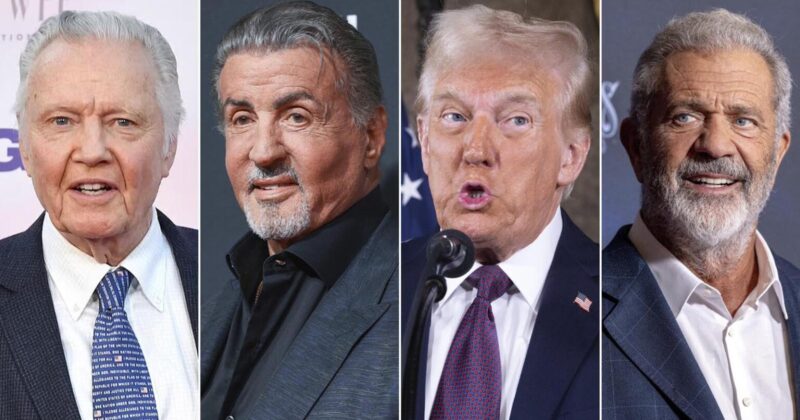The heart of American cinema, Hollywood, has long stood as a beacon of cultural influence across the globe. On Thursday, President-elect Donald Trump tapped three of the industry’s biggest names—Jon Voight, Sylvester Stallone, and Mel Gibson—for high-profile roles in his incoming administration.
These stars aren’t headed to the big screen but to a new stage: as Special Ambassadors for Hollywood, California. Announcing the appointments on his social media platform Truth Social, Trump declared that Voight, Gibson, and Stallone would act as his “eyes and ears” in the entertainment capital, tasked with reviving an industry he claims has been bleeding business to foreign markets.
“It is my honor to announce Jon Voight, Mel Gibson, and Sylvester Stallone to be Special Ambassadors to a great but very troubled place, Hollywood, California,” Trump posted Thursday morning. “They will serve as Special Envoys to me for the purpose of bringing Hollywood, which has lost much business over the last four years to Foreign Countries, BACK—BIGGER, BETTER, AND STRONGER THAN EVER BEFORE!”
Voight, an outspoken Trump supporter and Academy Award-winning actor, is no stranger to politics. He campaigned for Trump in both 2016 and 2020 and frequently uses his platform to advocate for conservative values.
While less overtly political, Stallone has maintained ties to Trump over the years and famously posed with him in the Oval Office.
He has attended events at Trump’s Mar-a-Lago resort and was once rumored to be considered for a position in Trump’s administration as chairman of the National Endowment for the Arts. Stallone later declined the idea.
Gibson, known for his directorial work on films like The Passion of the Christ, has often praised American exceptionalism in his work. Gibson’s Malibu home of nearly 15 years was recently destroyed in the wildfires sweeping through Los Angeles County.
There has never been an official role such as a “Special Ambassador to Hollywood” within the United States government or any formal political institution. Appointing individuals to represent or manage Hollywood as a specific cultural or economic entity is unprecedented.
The Trump administration has long viewed Hollywood as a cultural battleground. During his presidency, Trump frequently criticized the industry for what he called its “anti-American” leanings. Now, with Voight, Stallone, and Gibson in the driver’s seat, his plan to restore the “Golden Age of Hollywood” may be one of the more unconventional storylines of his second term.
Historically, efforts to influence Hollywood have been more indirect, typically through policies, lobbying, or cultural initiatives. For example, the government worked with Hollywood during World War II to produce propaganda films and morale-boosting content.
In other instances, U.S. Presidents or First Ladies have collaborated with Hollywood stars for fundraising events or public service campaigns. Additionally, diplomacy programs have occasionally used the arts and entertainment as tools of soft power to promote American culture abroad.

